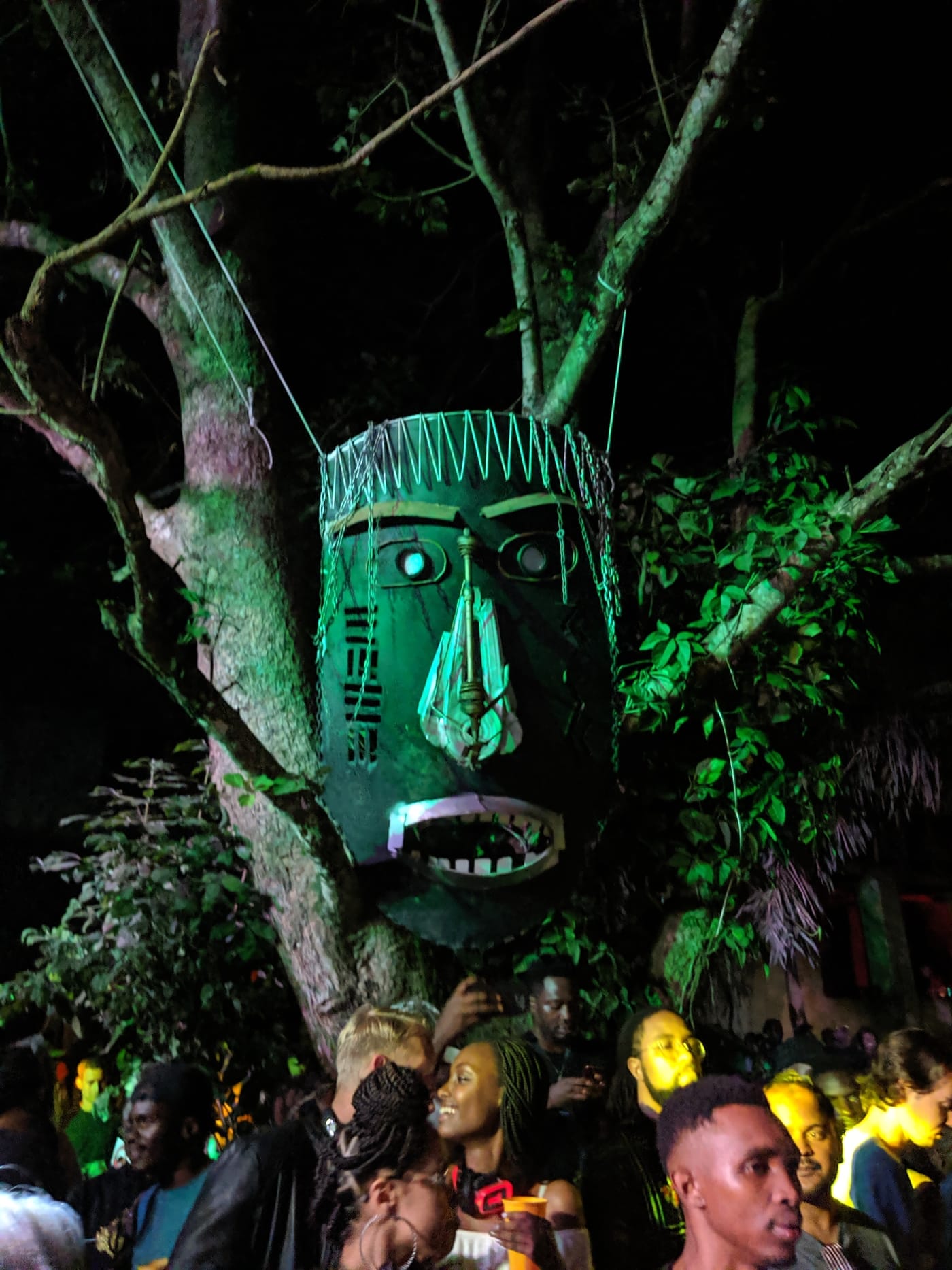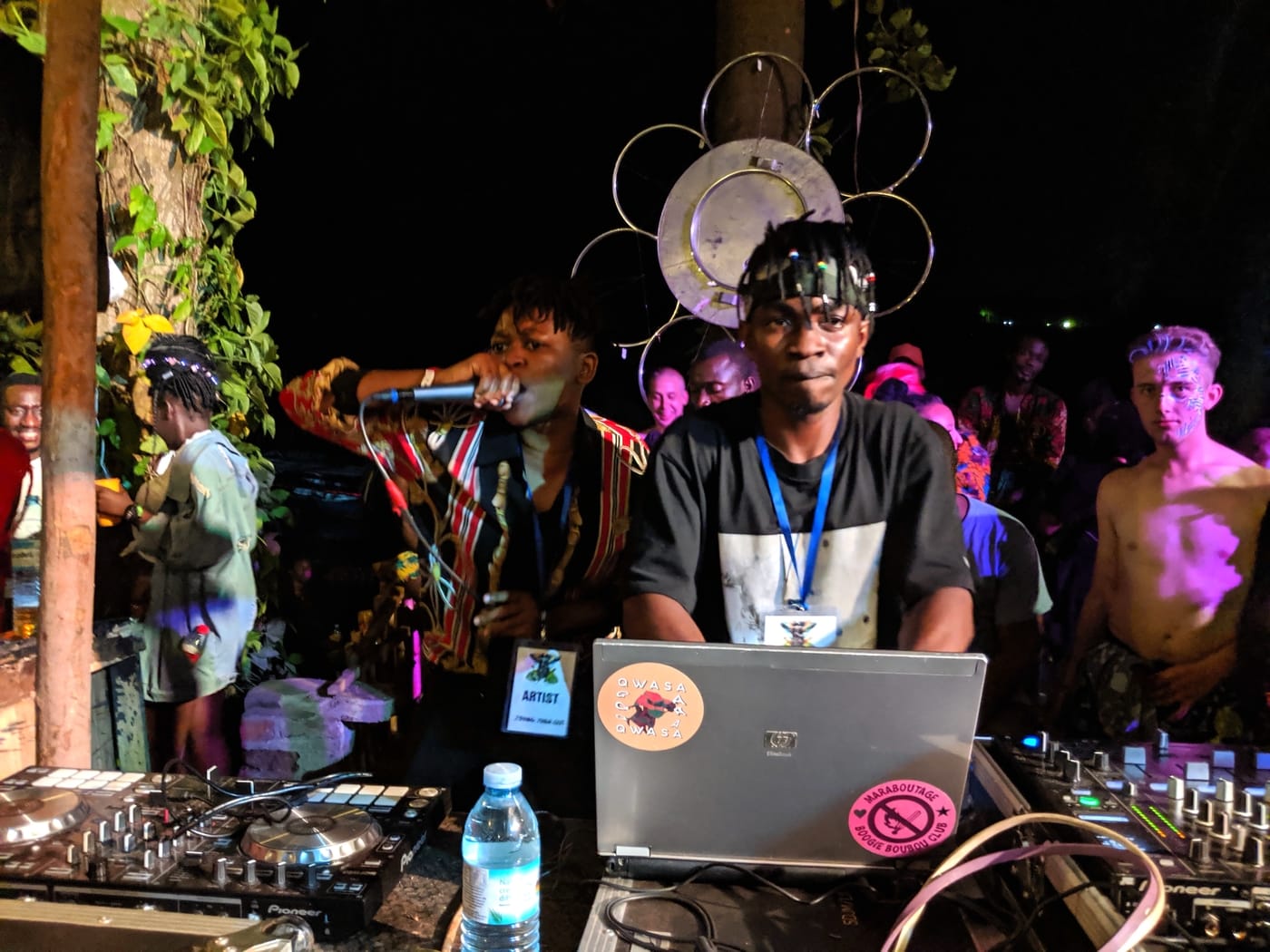Little was known until recently of the futuristic sound emerging from the ghettos of Dar es-Salaam, which now is exporting itself to dance floors across the globe. Ten years on from its conception, singeli has gone from being the social outcast to becoming a source of national pride. PAM catches up with some of its most talented sonic architects during the latest edition of Nyege Nyege Festival.
PAM & Le Point Fort launch Nyege Nyege Festival in Paris (July 16, 2022)
A breathtaking, and provocative electronic music, singeli perfectly embodies the energy of Nyege Nyege Festival, whose name means “an irresistible desire to dance”. While its fledgling festival-goers eventually surrender to its tempo – oscillating wildly between 180 and 300 bpm – singeli already has its own signature chura dance whose frenetic on-the-floor twerk-outs mesmerise a captivated circle that forms around it.
Since 2017, Nyege Nyege Festival has become a crucial platform for those looking to sample singeli while an increasing number of MC’s and producers brave the 36-hour bus ride from Tanzania to Uganda. Once again, a huge crew makes the trip over: Sisso, Bamba Pana, Jay Mitta, Rehema Tajiri, MCzo & Duke, Anti-Virus, MC Memory Card, MC Card Reader and Young Duda, whose performances all erupt into intense scenes of joy on the banks of the White Nile. “The speed of the singeli creates warmth and energy that takes a hold of everyone… it’s pure magic,” Sisso explains, shyly.
“The singeli is a very intense body experience. Once you get the beat, you can dance for hours; it’s like a trance,” enthuses Rehema Tajiri. Made of mutating loops infused with a punk energy that makes gabber sound like children’s nursery rhymes, singeli now dominates Tanzania’s radios, dancefloors, block parties and festivals. “The music is very powerful, it’s pure adrenaline. But it is also a movement that unites all Tanzanians: it is our new national emblem, a real source of pride. The whole world will soon know about it,” predicts Jay Mitta, with a gunfire-like flow.
Bamba Pana x Makaveli —Boiler Room Nyege Nyege Festival 2018
Selling out the stadiums
Conceived ten years ago in Dar es-Salaam, the sprawling capital at the crossroads of Arab, Indian and African history and traditions, singeli is likewise placed at the crossroads of various cultures and generations. Like South African zulu house or Brazilian baile funk, singeli was born as an electronic interpretation turned mutation – or even deconstruction – of native music, produced with inexpensive computer software. Initially, it borrowed from traditional vanga polyrhythms of the Zaramo tribe, popularized in the 1980s by mchiriku: producers who reinterpreted these rhythms on Casio synths. In the early stages of the genre, singeli also copiously sampled instrumental sections of taarab, however as local taarab musicians became irritated by this, they eventually turned to neighboring Congo’s soukouss, South Africa’s kwaito and Tanzania’s hip-hop. Speed up the beats, apply glitches, add super-intense rapping in Swahili and you arrive at singeli.
In 2018, Bamba Pana released Poaa (“cool”) on the Ugandan label Nyege Nyege Tapes: nine solid tracks of abrasive beats at extreme tempos. Bamba Pana is undoubtedly the most extreme producer from Dar es-Salaam. But as unhinged as he may be, he doesn’t seem ready to sacrifice everything to the altar of speed. Coming from the Luguru tribe, the 30-something crushes marimba samples in “Baria”, manipulating an instrument traditionally used for the ritual ceremonies that allow the passage of girls into adulthood. A man of few words, all he told us was: “This is very important to me.”
In the past ten years, the sound has evolved and some of its producers now regularly enrich the music with life’s everyday source materials: Jay Mitta samples a cat’s meow on “Masera“, while Duke frantically speeds through radio samples for almost eight minutes on “Naona Laaah“. Although difficult to digest at its most experimental, it still remains fascinating, and gave birth to a ton of hits such as Jay Mitta’s “Tatizo Pesa” featuring 15-year-old Dogo Mjanja and Bamba Pana’s “Lingalinga” with singeli pioneer-veteran MC Makaveli. Setting fire to dance floors… and selling out stadiums!
MCZO x Uswahili Music Flavor Show @ Mbagala en 2016
Sisso Studio
But before singeli brought together thousands of people in the club or anywhere in Tanzania and beyond, the genre first raged in the block parties of Manzese and Tandale, two working-class districts on the outskirts of Dar es-Salaam at the kigodoros. Marathon party sessions named after the foam mattresses dancers would collapse on from exhaustion. At weddings now too, for the North Ugandan acholi people, orchestras have gradually been replaced by more affordable machines, and traditional themes replaced by their electronic counterparts born from experiments with rhythm machines by the father of acholitronix, Otim Alpha – also releasing on Nyege Nyege Tapes. The final decisive course in the development and democratising of the genre was the aptly named “FM Radio” broadcasts, a weekly three-hour program dedicated to singeli, regularly hosting freestyle sessions and competitions. By directly transmitting into the cars and homes of the Tanzanian middle class, singeli has become, in only a few years, a music as popular now as local pop genre bongo flava.
Sisso x Rehema Tajiri — Boiler Room Nyege Nyege Festival 2018
“I’ve been a fan of singeli for a long time,” said Rehema Tajiri, a single mother and former mainstream EDM singer turned singeli MC. “Whenever I discovered a new track, it always came from Sisso Studio. I wanted to learn more and then I said to myself… why not me?” When Rehema Tajiri finally met the owner of Sisso Studio in 2016, she had no idea that she was about to discover a legitimate community of artists – her new family – and the epicenter of the phenomenon where people hang out as much as they create. Before he created the studio bearing his namesake and imposed singeli as his own trademark, the producer Sisso would compose music on a laptop in his bedroom – when he was not selling DVDs on the street to make a living. Today, MCs and producers come from afar to visit him at his Mburahati home or to meet Duke, also embellished in the singeli scene with his label Pajoma Records, just a kilometer away from Sisso. “I am very proud of the studio and the work created by the artists of the crew that promote singeli. Every single one of them is preparing a new album for 2020, a big year for singeli,” announces Sisso.
The women of singeli
While pioneers like MC Makaveli are still active in supporting up-and-coming producers, others have changed career paths, such as Dogo Niga who became a doctor and now only performs freestyles on occasion. However, they inspired an entire generation, and opened up the scene to female talent.
Kadilida aka. MC Card Reader — sONg mZuka (prod. Jay Mita)
“Women – myself included – arrived late in the singeli scene because they did not allow themselves to participate, as they thought it was not for them,” analyzes Young Duda. Slightly boastful, she continues: “I’m 22 years old and I’m the first female MC. I’m glad I dared to do it. I opened the doors and other women are now joining!” The newcomers who followed her path are Anti Virus, MC Memory Card – “the most promising singeli MCs”, according to Kampire. MC Card Reader and Rehema Tajiri who could easily be mistaken for their mothers, deploy all the more energy on stage. “I hope there will be more of us. Not only do we emancipate ourselves, but above all we express ourselves”, she rejoices, adjusting her fine braids.
Naturally, every MC touches upon different themes: from heart problems to financial difficulties, trouble at school, at home or with the authorities, unemployment and dreams of glory, excessive partying… A story of Tanzanian youth, made up of social commentary and personal encounters. Young Duda on the other hand takes it further by giving singeli a didactic, bordering on moral function. “In one of my lyrics, I address women and advise them not to have an abortion, because I think that life is too precious. In another text, I tell the guys to go to school, not to smoke too much weed, and take good care of their kids and parents. As I encourage good behavior, my family fully supports me,” she explains, self-assured and proudly adorning a pair of Nikes on her feet.

Bamba Pana
From the street to the state palace
It’s apparent that Singeli carries a negative stigma in Tanzania. Firstly because the genre was born on the streets of Dar es-Salaam’s most notorious neighborhoods, in the same way as hip-hop: “what is poor is scary, this has always been the fate of ghetto music,” according to Bamba Pana. Up until last spring, local police regularly interrupted block parties, cutting off the power supply and even arresting Jay Mitta during one of his shows. But Jay asks to skip the questions on this: Singeli is not protest music. So why would it bother President Magufuli’s regime – nicknamed “tingatinga” (“the bulldozer” in Swahili) for its highly repressive policy against any form of opposition since being elected in 2015?
An initial lead suggests that because of its popularity amongst unemployed youths, singeli was associated with uhuni, i.e. gang violence and drug trafficking. According to Rehema Tajiri, it was more of a misunderstanding with the authorities. “The shows attract a huge audience. Quite naturally, sometimes there are excesses and misbehavior. The government thought that singeli was the only reason behind this, but I don’t see anything in it that’s threatening to national security…” she regales, laughing. Sisso admits he still has to scheme sometimes in order to be given permission to play in the city. “But we can’t complain. Today, singeli artists are paid for composing and performing their music. Some of us even manage to live off of it.” With the mannerisms of a rap superstar, Jay Mitta concludes in his own way: “Our daily life has improved significantly since we started to play singeli. My mission? Make money, yeah.”
Perhaps due to an opportunist attempt at populism, the Tanzanian authorities today seem to have fully embraced singeli. “The government has understood that we are not thugs and that we are promoting good things towards young people,” said Rehema Tajiri. Suddenly, Abbas – manager, driver and translator – abruptly interrupts her: “the government supports singeli, they play it in political assemblies, official meetings and even at the state palace, they say. We can freely request and obtain visas to go and play abroad. It’s all that matters. Our president is good for Tanzania, he is great.” Some awkwardness arises. Because quite evidently, everyone walks on eggshells when it comes to talking about politics. Journalists, businessmen, politicians, and even artists… since 2016 the Tanzanian Human Rights Defenders Coalition has identified 17 kidnappings – with several tragic endings. This is perhaps one of the reasons why most singeli artists seize the slightest opportunity to perform abroad.
Bamba Pana & Makaveli @ Barlok Brussels 2018
For the fans
“When Arlen arrived at the studio in 2016, it was the first time that a white man had come to my house. I immediately felt that something was about to change,” recalls Sisso. As for Arlen Dilsizian, ethnomusicologist and co-founder of Nyege Nyege, he was lucky enough to end up inside Abbas’ taxi when he arrived in Dar es-Salaam, in search of singeli. Sounds Of Sisso, the first compilation dedicated to the genre, was released on the Ugandan label the following year, creating the seal for a lasting friendship, and paving the way for Bamba Pana (Poaa, 2018), Jay Mitta (Tatizo Pesa, 2019) and the more hip-hop-oriented Duke (Uingizaji Hewa, 2019). Since then, it’s not uncommon to find Sisso, Bamba Pana and their colleagues on the line-up for a number European festivals – Barlok Brussels in Belgium (2018), Rewire in Holland (2019) or Insomnia in Norway (2020). And although its artists may not speak English or easily obtain visas, singeli embraces the challenges. Today, everyone still dreams of becoming stars in the United States.
Beginning to mutate after ten years of existence, singeli now attracts the attention of veteran international artists, fascinated by its frenetic drums. In 2018, German producer Errorsmith and Scottish experimental group The Modern Institute featured alongside Sisso and Jay Mitta on the excellent mixtape produced in only two weeks at Nyege Nyege Tapes’ headquarters in Kampala, during the festival that each year equally generates its share of miraculous encounters. But the most surprising one comes when observing the genre’s impact on Tanzania, mainly on the stars of bongo flava such as Man Fongo, Sholo Mwamba and Msaga Sumu who have adopted the singeli rhythm in their most recent productions. “Good for them! As far as we are concerned, we do not know any form of compromise. We will never lose the spirit and the sound,” retorts Sisso.
TsGang — Dab Singeli (feat. Sholo Mwamba)
Man Fongo — Lau Nafasi
Here singeli definitively proves its influential power by mutating in its turn the music it took inspiration from – the same way jazz and soul eventually ended up borrowing from the world of hip-hop after originally, abundantly sampling them.
“For the last two years, we had to start playing singeli rhythms for the fans, because the demand for it exploded!” says Ali, percussionist for the Kisiwani Band. Invited for the second year in a row to perform at the Nyege Nyege Festival, the Tanzanian band has maintained the heritage of the Zaramo, Luguru and Manyema tribes since 1999. Until then the Kisiwani Band stuck exclusively to ceremonial music and royal dances in traditional outfits, but are now taking a side step towards singeli and its very suggestive chura dance, because “even if it takes us away from traditions, it is very good for business”. Are traditions threatened by the singeli tidal wave? “Of course not!” exclaims Ali, laughing. “Whatever happens, we can always play without electronics or electricity! Our traditions still have a bright future ahead of them.” If the tradition is perpetuated by completing the circle, singeli does it well. And even faster. With a bold future ahead of itself.

Nyege Nyege Festival 2019




